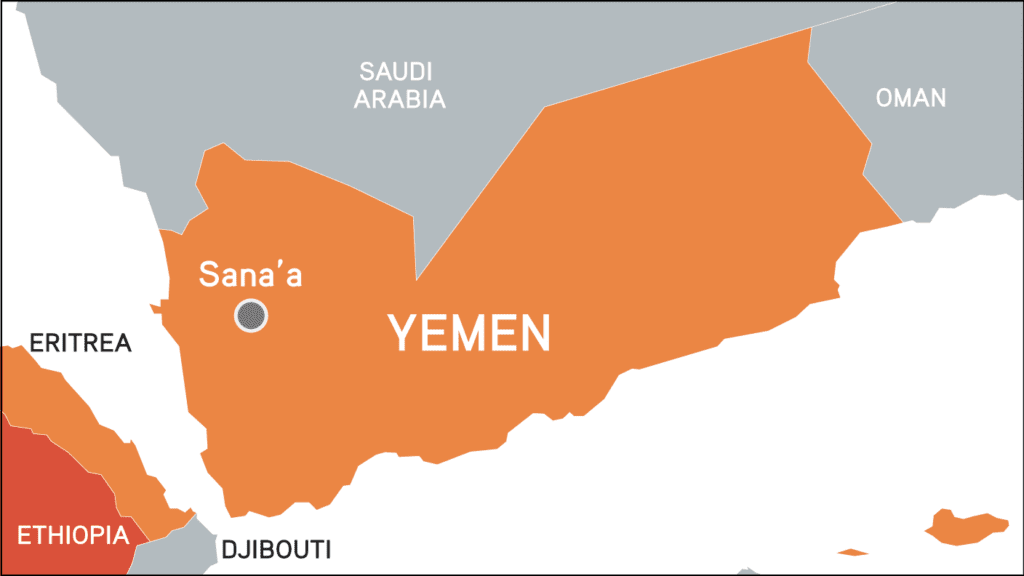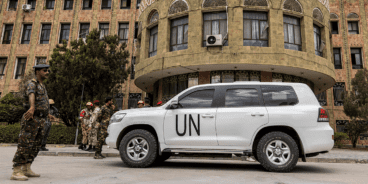Yemen

Despite a significant decrease in hostilities, populations in Yemen remain at imminent risk of war crimes and crimes against humanity.
BACKGROUND:
Since 2015 civilians in Yemen have suffered from recurrent war crimes and crimes against humanity. Fighting between Houthi forces, the Southern Transitional Council (STC) and forces loyal to the internationally recognized government – as well as airstrikes by a Saudi Arabia and United Arab Emirates (UAE)-led international coalition – have resulted in the death of thousands of civilians since March 2015. More than 19,200 civilians, including over 2,300 children, have been killed or maimed as a result of coalition airstrikes alone. The conflict has displaced at least 4 million people and created one of the world’s worst humanitarian crises.
The UN Security Council (UNSC)-mandated Panel of Experts on Yemen has reported that since 2015 arbitrary arrests and detention, enforced disappearances, ill-treatment and torture of detainees have been conducted by all parties to the conflict. From 2018-2021 the UN Group of Eminent Experts (GEE) on Yemen also documented a pattern of violations and abuses of international law perpetrated by all parties to the conflict that may amount to war crimes, including indiscriminate airstrikes and shelling, torture, arbitrary detention and sexual and gender-based violence, as well as attacks on essential civilian infrastructure such as water reservoirs and hospitals. The GEE alleged that Canada, France, Iran, the United Kingdom (UK) and United States (US) may be complicit in these violations due to their provision of military intelligence, arms and logistical support to some parties to the conflict.
On 2 April 2022 parties to the conflict commenced a truce brokered by the UN Special Envoy for Yemen, Hans Grundberg, which expired six-months later. Although there was a significant decrease in civilian casualties during the truce – the first negotiated country-wide ceasefire since 2016 – some shelling, artillery, missile attacks, drone strikes and armed clashes continued while civilians were also subjected to violations and abuses human rights, including enforced disappearances, torture and sexual violence. Although hostilities have not escalated significantly following the truce expiration, at least 1,742 civilians have been killed since October 2022.
From November 2023 to December 2024, in response to Israel’s war on Gaza, Houthi forces in Yemen attacked commercial vessels in the Red Sea, including firing missiles and drones and arbitrarily detaining civilian crew members. From January 2024 the US and UK launched airstrikes across multiple parts of Yemen in response. According to the Yemen Data Project, over 300 airstrikes occurred, with 85 civilian casualties reported as of February 2025. The UNSC adopted a resolution on 10 January 2024 demanding Houthi forces immediately cease these attacks.
Prior to the Red Sea attacks, Saudi officials and Houthi leadership engaged in negotiations brokered by Oman, as well as UN Special Envoy Grundberg, agreeing in December 2023 to preliminary steps toward a ceasefire. Political negotiations thus far have not included affected communities, including victims and survivors, as well as certain parties to the conflict, minority groups and women. In July 2023 over 60 Yemeni civil society organizations released the Yemen Declaration for Justice and Reconciliation, in which they set forth their common vision for achieving justice and reconciliation in post-conflict Yemen.
The crisis in Yemen has been ongoing for over 20 years, but dramatically escalated during 2014 when, amid a UN-facilitated political transition process, Houthi forces and military units loyal to former President Ali Abdullah Saleh took control of numerous governorates, including the capital Sana’a, and forced then President Abd Rabbu Mansour Hadi and his government to resign. On 26 March 2015 the Saudi/UAE-led coalition launched a military intervention in Yemen to restore the internationally recognized government of President Hadi.
The UNSC has imposed financial sanctions and travel bans on former President Ali Abdullah Saleh and Houthi leaders, as well as an arms embargo on the Houthis.
RECENT DEVELOPMENTS:
Since 31 May 2024 Houthi authorities have arbitrarily detained and forcibly disappeared dozens of UN and civil society staff. They have accused some people, including former US embassy and UN staff, of crimes that carry the death penalty while denying them due process. Between 23-25 January Houthi authorities detained at least 8 additional UN personnel. In response, the UN has paused operations in the Houthi-controlled Sa’ada governorate. On 25 January Houthi authorities unilaterally released 153 “conflict-related detainees,” with the support of the International Committee of the Red Cross.
In January, following the Israel-Hamas ceasefire agreement for Gaza, the Houthis released 25 arbitrarily detained crew members from commercial ships on the Red Sea and announced a pause in maritime attacks, committing to halt them entirely, contingent on the full implementation of the Gaza ceasefire. On 11 March, after Israel reinstated its aid blockade on Gaza, the Houthis announced they would resume attacks on Israeli ships in the Red Sea.
On 4 March 2025 US President Donald Trump re-designated the Houthis as a “foreign terrorist organization.”
ANALYSIS:
While the reduction of hostilities provides tangible relief to civilians, atrocity risks remain until a permanent truce and inclusive negotiated peace settlement are reached and extensive justice and accountability efforts, including reparations to victims, are advanced. The recent de-escalation of the Red Sea attacks offers an opportunity to revitalize ceasefire efforts in Yemen. However, the fragility of the Gaza ceasefire and the US terrorist redesignation of the Houthis, risk a return to attacks that would further stall peace talks. The lack of inclusive dialogue throughout the negotiations process limits the capacity of these groups to advocate for their protection and risks entrenching impunity for past violations. Ongoing patterns of violations against minority communities demonstrate targeted persecution of religious minorities by Houthi security forces.
All parties to the conflict have perpetrated indiscriminate attacks and targeted civilian objects, amounting to war crimes and crimes against humanity. The protracted crisis in Yemen has been exacerbated by pervasive impunity that has fueled lawlessness and resulted in extensive civilian harm. Since the termination of the GEE in October 2021 there has been no independent mechanisms dedicated to monitoring violations in Yemen and there is no other international body paving the way toward justice and accountability. The dire humanitarian situation is a direct result of the armed conflict and likely atrocity crimes perpetrated by warring parties.
RISK ASSESSMENT:
-
- Ongoing serious human rights violations and violent incidents.
- Legacy of likely atrocity crimes perpetrated before 2014 and recent history of crimes perpetrated by all parties to the conflict.
- Impunity enjoyed by all perpetrators, fueled by an inability and/or unwillingness of the international human rights system to effectively address the situation.
- Inadequate protection for and ongoing threats toward minorities, women, children, human rights defenders and internally displaced persons.
- Political, economic and social instability, increasing the risks of return to large-scale conflict.
NECESSARY ACTION:
All parties to the conflict should fully recommit to a country-wide truce and reach a negotiated end to the protracted conflict, while all stakeholders, including third party states, must preserve progress made thus far. Any political negotiations should include all relevant parties to the conflict and other key groups in Yemen, as well as ensure that accountability and justice feature prominently in the peace process. All key stakeholders must take steps to implement the Yemen Declaration for Justice and Reconciliation.
The government of Yemen should allow access to representatives from the Office of the UN High Commissioner for Human Rights and ensure that all potential war crimes and crimes against humanity are properly investigated and prosecuted. All parties to the conflict – with assistance from the international community – must ensure the provision of reparations to all victims of international crimes. UN member states should urgently work to establish a new transitional justice-focused mechanism to advance accountability and reparations. The UNSC should refer the situation in Yemen to the International Criminal Court.
Atrocity Alert No. 325: Ethiopia, Myanmar (Burma) and Yemen
Related Content

Atrocity Alert No. 443: Sudan, Israel and the Occupied Palestinian Territory and United States Travel Ban

